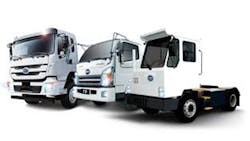Cities Shop for $10 Billion of Electric Cars to Defy Trump
Dozens of U.S. cities are willing to buy $10 billion of electric cars and trucks to show skeptical automakers there’s demand for low-emission vehicles, just as President Donald Trump seeks to review pollution standards the industry opposes.
Thirty cities including New York and Chicago jointly asked automakers for the cost and feasibility of providing 114,000 electric vehicles, including police cruisers, street sweepers and trash haulers, said Los Angeles Mayor Eric Garcetti, who is coordinating the effort. That would be comparable to about 72% of total U.S. plug-in sales last year.
While urban leaders want more low-emission vehicles to ease the role city traffic plays in altering the climate, automakers say there aren’t enough buyers. They also have advocated for relaxing rules on traditional fuel vehicles. The Trump administration, which seeks to cut regulations it sees as too costly or onerous, is poised to announce Wednesday that it will reconsider tighter standards finalized a week before President Barack Obama left office.
“No matter what President Trump does or what happens in Washington, cities will continue leading the way on tackling climate change,” said Matt Petersen, Los Angeles chief sustainability officer.
The initiative is still in the early stages, and the cities haven’t actually ordered any of the 114,000 vehicles. Rather, they’ve taken what’s typically the first step in a formal bidding process by inviting manufactures to outline plans to supply them. Plus, some cities are asking about vehicles that don’t exist yet, such as electric fire engines and heavy-duty trucks.
The initiative could move the market nonetheless, said Colin McKerracher, an analyst with Bloomberg New Energy Finance. Orders for that many electric vehicles would be a significant driver for the U.S. plug-in market, which totaled 160,000 in 2016. While the initiative would probably be spread out over several years, it would provide electric vehicle manufacturers reliable demand as federal policies shift and gas prices fluctuate.
“I wouldn’t underestimate this,” McKerracher said. “What automakers really want in investing in electrification, whether that’s for passenger vehicles or commercial-use vehicles, is certainty.”
Demonstrating Demand
The mayors, mostly Democrats, want to demonstrate that demand for low-emission vehicles is robust. “If you build it, we will buy it,” Chris Bast, Seattle’s climate and transportation policy adviser, said in an interview.
Myron Ebell, the former head of Trump’s Environmental Protection Agency transition team, said consumers are the ones who want less stringent fuel economy standards. “This is not coming from the auto industry -- it’s coming from consumers and the auto dealers association,” said Ebell, who left the Trump transition team in January.
Carmakers have invested heavily in cutting emissions, offering 95 different varieties of hybrids and electric vehicles last year, said Wade Newton, a spokesman for the Alliance of Automobile Manufacturers trade group. However, Americans still prefer gasoline-powered vehicles, he said.
“Combined, those models were all outsold by a single model of pickup truck,” Newton said.
Los Angeles began spearheading the effort for a joint electric-vehicle order during the run-up to the Paris climate accord in late 2015. The request to automakers went out earlier this year, initially with an order for 24,000 vehicles from Los Angeles, San Francisco, Portland and Seattle. Twenty-six other cities have since joined, including Boston, Denver, Kansas City and Houston.
Nearly 40 automakers, truck makers, bus makers and others have responded so far, Petersen said.
‘Cities’ Leadership’
Tail-pipe fumes are crucial in the fight to stop global warming. Emissions from cars and trucks became the largest U.S. source of greenhouse gases last year, surpassing power plants for the first time since 1979. That makes the EPA standards that Trump is eyeing central to help the U.S. meet its goals under the Paris climate deal.
“Now more than ever there is a need for cities’ leadership on climate,” Daniel Zarrilli, New York City’s senior director of climate policy and programs, said in an interview. “We really want to send a message that there is a growing market for electric vehicles -- regardless of what is happening in D.C.”
By Joe Ryan
About the Author
Bloomberg
Licensed content from Bloomberg, copyright 2016.
